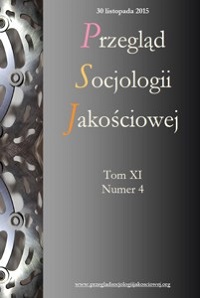Action, Expertise, Knowledge. On Works of Harry Collins
DOI:
https://doi.org/10.18778/1733-8069.11.4.08Keywords:
Science and Technology Studies (STS), Harry Collins, Tacit Knowledge, Ethnography, Strong Edinburgh Programme, Actor-Network TheoryAbstract
The review essay discusses books of Harry Collins and co-authors (“trilogy of expertise”). The discussed works are attempts to sort out theoretical outcomes from the ethnographic studies done within Science and Technology Studies. The review essay collates these books with theoretical proposals of Bruno Latour, and pinpoints the potential of application these have within general qualitative research, especially in studies of craftsmanship, expertise, and tacit knowledge.
Downloads
References
Abriszewski Krzysztof (2012) Poznanie, zbiorowość, polityka. Analiza Teorii Aktora-Sieci Bruno Latoura. Kraków: Universitas.
Google Scholar
Afeltowicz Łukasz (2012) Modele, artefakty, kolektywy. Praktyka badawcza w perspektywie współczesnych studiów nad nauką. Toruń: Wydawnictwo UMK.
Google Scholar
Bijker E. Wiebe, Hughes Thomas P., Pinch Trevor (2012) The Social Construction of Technological Systems: New Directions in the Sociology and History of Technology. Cambridge, MA: MIT Press.
Google Scholar
Bloor David (1983) Wittgenstein: A Social Theory of Knowledge. London: Macmillan.
Google Scholar
DOI: https://doi.org/10.1007/978-1-349-17273-3
Callon Michel, Latour Bruno (1992) Don’t Throw the Baby Out With the Bath School! [w:] Andrew Pickering, ed., Science as a Practice and Culture. Chicago, London: University of Chicago Press, s. 343‒369.
Google Scholar
Collins Harry (1974) The TEA Set: Tacit Knowledge and Scientific Networks. „Science Studies”, vol. 4, s. 165‒186.
Google Scholar
DOI: https://doi.org/10.1177/030631277400400203
Collins Harry (1985) Changing Order: Replication and Induction in Scientific Practice. Chicago: University of Chicago Press.
Google Scholar
Collins Harry (2004) Gravity’s Shadow: The Search for Gravitational Waves. Chicago: University of Chicago Press.
Google Scholar
DOI: https://doi.org/10.7208/chicago/9780226113791.001.0001
Collins Harry (2010) Tacit and Explicit Knowledge. Chicago: University of Chicago Press.
Google Scholar
DOI: https://doi.org/10.7208/chicago/9780226113821.001.0001
Collins Harry (2014) Are We All Scientific Experts Now? Cambridge: Polity Press.
Google Scholar
Collins Harry, Yearley Steven (1992) Epistemological Chicken [w:] Andrew Pickering, ed., Science as a Practice and Culture. Chicago, London: University of Chicago Press, s. 369‒390.
Google Scholar
Collins Harry, Kusch Martin (1998) The Shape of Actions: What Humans and Machines Can Do. Cambridge, London: MIT Press.
Google Scholar
DOI: https://doi.org/10.7551/mitpress/6200.001.0001
Collins Harry, Evans Robert (2002) The Third Wave of Science Studies. Studies of Expertise and Experience. „Social Studies of Science”, vol. 32, s. 235‒296.
Google Scholar
DOI: https://doi.org/10.1177/0306312702032002003
Collins Harry, Evans Robert (2007) Rethinking Expertise. Chicago, London: University of Chicago Press.
Google Scholar
Dreyfus Hubert (1992) What Computers Still Can’t Do. Cambridge, MA: MIT Press.
Google Scholar
Dreyfus Hubert, Dreyfus Stuart (1988) Mind Over Machine. New York: Free Press.
Google Scholar
Fleck Ludwik (2014) Teoriopoznawcze rozważania nad historią odczynu Wassermana [w:] Ewa Bińczyk, Aleksandra Derra, red., Studia nad nauką i technologią. Wybór tekstów. Toruń: Wydawnictwo UMK, s. 25‒46.
Google Scholar
Hackett Edward J. i in. (2008) The Handbook of Science and Technology Studies. Cambridge, MA: MIT Press.
Google Scholar
Knorr-Cetina Karin (1981) Manufacture of Knowledge. New York: Pergamon Press.
Google Scholar
Lamont Michèle (2010) How Professors Think: Inside the Curious World of Academic Judgment. Cambridge, MA: Harvard University Press.
Google Scholar
DOI: https://doi.org/10.4159/9780674054158
Latour Bruno (2009) Polityka natury. Przełożyła Agata Czarnacka. Warszawa: Wydawnictwo Krytyki Politycznej.
Google Scholar
Latour Bruno (2010) Splatając na nowo to co społeczne. Wprowadzenie do teorii aktora-sieci. Przełożył Krzysztof Abriszewski. Kraków: Wydawnictwo Universitas.
Google Scholar
Latour Bruno (2012) Wizualizacja i poznanie. Zrysowywanie rzeczy razem. Przełożyli Aleksandra Derra i Maciej Frąckowiak. „Avant”, t. 3, s. 207‒257.
Google Scholar
Latour Bruno, Woolgar Steve (1986) Laboratory Life: The Construction of Scientific Facts. Princeton, NJ: Princeton University Press.
Google Scholar
DOI: https://doi.org/10.1515/9781400820412
Lynch Michael (1985) Art and Artifact in Laboratory Science: A Study of Shop Work and Shop Talk in a Research Laboratory. Cambridge: Cambridge University Press.
Google Scholar
Norman Donald A. (1988) Design of Everyday Things. New York: Doubleday.
Google Scholar
Polanyi Michael (1967) The Tacit Dimension. London: Routledge and Kegan Paul.
Google Scholar
Saldaña Johnny (2012) The Coding Manual for Qualitative Researchers. Los Angeles, London, New Delhi, Singapore, Washington: Sage.
Google Scholar
Sismondo Sergio (2011) An Introduction to Science and Technology Studies. Chichester: Wiley-Blackwell.
Google Scholar
Sokal Alan, Bricmont Jean (2004) Modne bzdury. Przełożył Piotr Amsterdamski. Warszawa: Prószyński i S-ka.
Google Scholar
Star Leigh Susan (1991) Power, Technology, and the Phenomenology of Conventions: On Being Allergic to Onions [w:] John Law, ed., A Sociology of Monsters: Essays on Power, Technology, and Domination. London, New York: Routledge, s. 26‒56.
Google Scholar
DOI: https://doi.org/10.1111/j.1467-954X.1990.tb03347.x
Downloads
Published
How to Cite
Issue
Section
License

This work is licensed under a Creative Commons Attribution-NonCommercial-NoDerivatives 4.0 International License.














